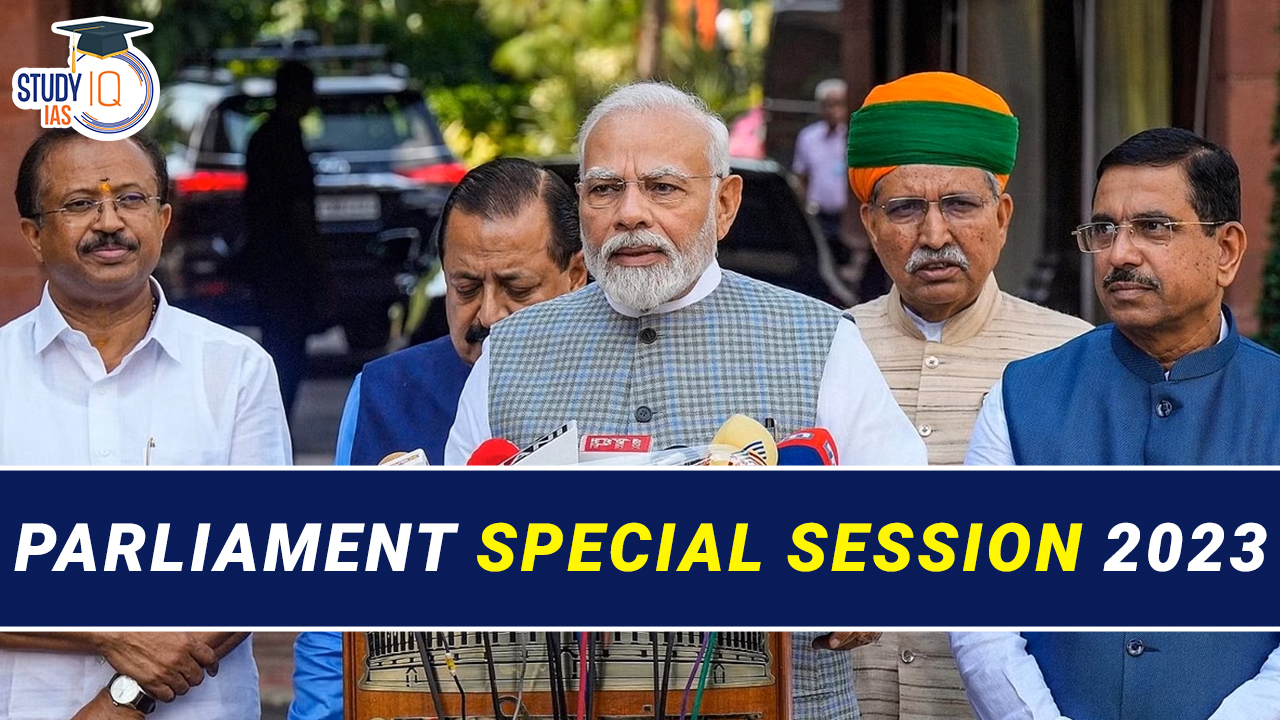Table of Contents
Parliament Special Session 2023
Parliament Special Session 2023 is scheduled to be held between September 18, 2023 and September 22, 2023 and there will be a total of 5 sittings in the New Parliament Building. A discussion on the subject “Parliamentary Journey of 75 years starting from Samvidhan Sabha – Achievements, Experiences, Memories and Learnings” will be held in both Houses on September 18, 2023. A 5-days Parliament Special Session 2023 will not include Question Hour, Zero Hour, or Private Member Business. Currently, 37 Bills are pending in Parliament, of which five are listed for consideration and passing in this session. These are listed below:
- The Chief Election Commissioner and other Election Commissioners (Appointment, Conditions of Service and Term of Office) Bill, 2023
- The Advocates (Amendment) Bill 2023
- The Repealing and Amending Bill 2023
- The Post Office Bill 2023
- The Press and Registration of Periodicals Bill 2023
Agenda of the Parliament Special Session 2023
The government has lined up a discussion on the “Parliamentary Journey of 75 years starting from Samvidhan Sabha — Achievements, Experiences, Memories and Learnings” along with the presentation of five pending bills.
- The government will present the ‘The Advocates (Amendment) Bill, 2023’ and ‘The Press and Registration of Periodicals Bill, 2023’ in Lok Sabha. The two bills were passed by the Rajya Sabha during the monsoon session last month.
- ‘The Post Office Bill, 2023’ is also listed to be presented in the Lok Sabha after it was introduced in the Rajya Sabha on August 10. The bill aims to replace the Indian Post Office Act (1898) in the changing role of post offices
-
The Chief Election Commissioner and other Election Commissioners (Appointment, Conditions of Service and Term of Office) Bill, 2023 is also part of the list of businesses for the special session.
What is a special session of the parliament?
A unique meeting called by the parliament that does not take place during the normal sessions is referred to as a special session.
In the Indian Constitution, the phrase “special session” is not addressed specifically. It meets in accordance with the terms of Article 85(1) of the Constitution.
In accordance with this clause, the President has the power to call a special session of the House in the event that an emergency proclamation is made. The President may call a special meeting to vote against the Emergency at the request of one-tenth of the Lok Sabha’s members.
Procedure of calling such Session
- The process for calling a special session of Parliament is outlined in Article 85(1) of the Indian Constitution.
- This constitutional clause gives the President the power to convene Parliament, including for special sessions if needed.
- Article 85(1) States – “The President shall from time to time summon each House of Parliament to meet at such time and place as he/she thinks fit, but six months shall not intervene between its last sitting in one session and the date appointed for its first sitting in the next session.“
The Constitution does not forbid the Parliament from meeting frequently, although it does prescribe two sessions every six months for normal sessions.
History of Parliament Special Sessions
- On August 14 and 15, 1947, the first-ever special session of the Parliament was held to commemorate India’s independence and the handover of sovereignty from the British.
- A delegation led by Atal Bihari Vajpayee, the leader of the Jan Sangh at the time, pushed for a special session of Parliament to debate the 1962 India-China war. On November 8, Prime Minister Jawaharlal Nehru called a meeting after granting his demand. Interestingly, a member suggested that the special session be held in “secret” due to the “sensitive” nature of the subject. Nehru, however, rejected the idea and claimed that the topics before the House were of “high interest to the entire country.” Later in the winter session, the Indian Parliament enacted the 1962 resolution on China, which vowed to recover every inch of territory taken by the Chinese.
- The majority of special sessions have been held to honor notable holidays or landmarks. For instance, a special session was held on August 15, 1972, to commemorate the silver anniversary of India’s independence.
- In accordance with the second clause of Article 356(4), a special session of the Rajya Sabha was conducted in February 1977 for two days to prolong the President’s Rule in Tamil Nadu and Nagaland..
- On June 3 and 4, 1991, a second two-day extraordinary session (the 158th Session), called in accordance with article 356(3), was held to approve the President’s Rule in Haryana. Both times the Lok Sabha was being dissolved when the Rajya Sabha convened. A midnight session was called on 9 August 1992 to celebrate the 50-year anniversary of the ‘Quit India Movement’.
Division of the Parliament Special Session
The Parliament Special Session can be classified into two parts:
| Division of the Parliament Special Session | |
| Special Sessions with Debates | Midnight Special Sessions (Without Debates) |
|
|
Constitution on Parliamentary Special Sessions
The Constitution does not specifically reference “special sessions.” However, a “special sitting of the House” is referred to in Article 352 (Proclamation of Emergency) of the Constitution, which was included to give protections to the authority to declare Emergency in the nation.
The framers of the Constitution borrowed it from the Government of India Act of 1935. It allowed the British Governor General to call a session of the central legislature at his discretion, requiring that the gap between two sessions should not be more than 12 months. However, the Constitution specifies that 6 months should not elapse between two parliamentary sessions.


 Daily Quiz 16 April 2025
Daily Quiz 16 April 2025
 Bhashanet Portal : Empowering Multilingu...
Bhashanet Portal : Empowering Multilingu...
 Soyuz Aircraft: History, Design and Sign...
Soyuz Aircraft: History, Design and Sign...





















